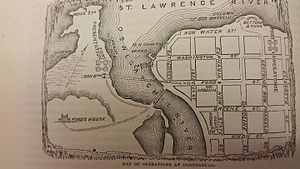Battle of Ogdensburg
| Battle of Ogdensburg | |||||||
|---|---|---|---|---|---|---|---|
| Part of War of 1812 | |||||||
 Battle of Ogdensburg |
|||||||
|
|||||||
| Belligerents | |||||||
|
|
|
||||||
| Commanders and leaders | |||||||
| George MacDonnell | Benjamin Forsyth | ||||||
| Strength | |||||||
| 520 | about 250 | ||||||
| Casualties and losses | |||||||
| 6 killed 44 wounded |
20 killed 6 wounded 70 captured |
||||||
The Battle of Ogdensburg was a battle of the War of 1812. The British gained a victory over the Americans and captured the village of Ogdensburg, New York. Although small in scale, it removed the American threat to British supply lines for the remainder of the war.
When the war broke out, a flourishing illicit trade was soon established between Ogdensburg and Prescott, Upper Canada (later to become the province of Canada West in 1841), on the Northern side of the Saint Lawrence River. This was checked early in October 1812 when the Americans reinforced the militia with some of the regular 1st U.S. Rifle Regiment under Major Benjamin Forsyth.
The British made an abortive attack with their own militia on October 3, which was quickly repulsed by the American forces in Ogdensburg, after which the militia dispersed. During the next few months, Forsyth's riflemen made several raids across the river, sniping at British troops and occasionally capturing boatloads of supplies on their way to Kingston, Ontario.
On February 21, 1813, Lieutenant General Sir George Prevost, the British Governor General of Canada, passed through Prescott on his way to review the situation in Upper Canada, accompanied by several detachments of reinforcements. He appointed Lieutenant Colonel "Red George" MacDonell as commandant of British troops in Prescott and left him instructions that he was to attack Ogdensburg only if the Americans weakened their garrison.
MacDonnell had other ideas. With the extra troops temporarily available, he determined to seize the opportunity. He planned for a company of the Glengarry Light Infantry, 70 militia and some light guns mounted on sleighs to make a frontal attack on the fort which housed Forsyth's riflemen. The main column, consisting of 120 men of the 8th (King's), 30 of the Royal Newfoundland Fencibles and 230 of the local militia flank companies, would cross the river lower down and attack from the flank.
...
Wikipedia
